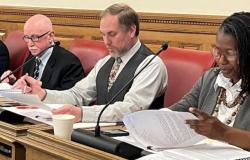LAMEZIA TERME The Accademia della Crusca has accepted the term “restanza”, coined by Vito Teti. In the book “Bread Stones. An anthropology of staying”, published in 2011, the scholar pointed out: «The adventure of staying – the fatigue, the harshness, the beauty, the ethics of remaining – is no less decisive and foundational than the adventure of travelling. The two adventures are complementary, they must be understood and narrated together.”
Then Teti considered two characteristics of many Calabrians: many of those who remain love to universalize the discussion on the qualities of their territory, which they consider unique in the world; numerous emigrants, however, have a fixed idea of their places of origin, almost the need – even today – to preserve a remote past that ubiquitous capitalism erases, alters or threatens. From them, young Calabrians from outside the region, who have left for university or are looking for work, experience the contradictions of their villages, modern in consumption but not in services, through social media. At the same time, those who live outside have clear personal hopes for collective redemption and a return to their home. The latter is an aspect that is generally little considered, although it is now evident and recurring. The “remainder”, according to Crusca, is the “attitude of those who, despite the difficulties and driven by desire, remain in their land of origin, with proactive intentions and initiatives for renewal”. Teti, in short, focused on a concept, which is also a distinctive element of residents in Calabria, especially in inland and mountain areas: staying is hard but in many ways necessary, a stimulus in a specific context somewhat marked by marginality, poverty and minority. Recently, in “La Repubblica delle idee” internal areas were debated in Naples, a topic which the Courier of Calabria. In particular, a plural comparison on the fate of the most isolated and least accessible places in the South made it possible to analyze the present and look at the local future in an objective manner. There, in Naples, the economist Pasquale Tridico contested, regarding the present, “the efficiency ennobled in the new public management”. According to the academic, former president of the INPS, the economy of scale has become the «measure of all things: for schools, for hospitals, for sports facilities, for public offices, the post office, the police and even for churches.” «Everything – observed Professor Tridico – is today focused on the mega, the metropolitan». The goal, the myth of efficiency, in short, is, to paraphrase the philosopher Protagoras, the measure of everything, which also inspires and guides the policies of the European Union, which pays little attention to the specificities of the territories and their differences; net of the declared European objective of supporting the recovery of the so-called “depressed areas”, including, indeed, Calabria. We should then ask ourselves what is the idea that the candidates for the EU Parliament, meanwhile Calabrians, have of the internal and mountainous areas of Calabria. We should ask ourselves how these candidates think that these territories can maintain residents and basic services, and whether, in their opinion, the places in question have a future, in a historical period in which size, administrative efficiency and reasons of economics and finance. Administrative centralization, amalgamations, mergers and marginalization of places with low population density are now a constant feature of modernity, in which practices of incorporating services, renouncing individual and collective rights and mechanical acceptance of penalizing decisions in the name of deviant rationalizations, essentially contrary to the human person. Today, therefore, the great challenge concerns the fate, the future of the places – so to speak – peripheral areas of Southern Italy and Calabria in particular, that is, those that are disconnected, poorly accessible, marginal and with inadequate public services. In this regard, it must be objected that the (dominant) logic of public investments favors investments such as the Variante di valico (between Tuscany and Emilia-Romagna), based on the size of the relevant users. The Ionian coast of Calabria appears to be affected precisely with regard to the strengthening of the railway and the state road. There are Calabrian local authorities that focus on the resources of their respective territories. Like Cotronei (Crotone), which will promote the national conference “Ecosystem, biodiversity, health and well-being: the potential of the Sila area” on 27 and 28 April, with the participation of the president of the Higher Institute of Health, Rocco Bellantoneof the president of the Regional Council of Calabria, Filippo Mancusoother public authorities and scientists and experts who will discuss, in this first meeting of the “Sila Scienza” project, the environmental peculiarities of the Sila area, the link between the healthiness of the environment and personal well-being, and the geodiversity of the plateau silano, on how to exploit the agri-food resources of the area, on the products of the undergrowth, on the characteristics of local olive growing in relation to health, on the valorisation of the historical-cultural landscape in Sila and on the advantages of the circular economy.
It is, therefore, an important event to follow, to reflect on and reason without prejudice. However, the basic question remains: it is sufficient to rely, regarding the future of the internal areas of Calabria and to avoid depopulation, on initiatives such as those of the Municipalities such as Riacewhich opened to the reception of non-EU citizens, such as Caccuri, which can boast its own literary festival, or like Belmonte Calabro, which attracts researchers and scholars from all over the world with wide-ranging cultural projects? We should try to give a true answer and follow-up to these questions.
([email protected])
Corriere della Calabria is also on WhatsApp. Just click here to subscribe to the channel and always be updated.



